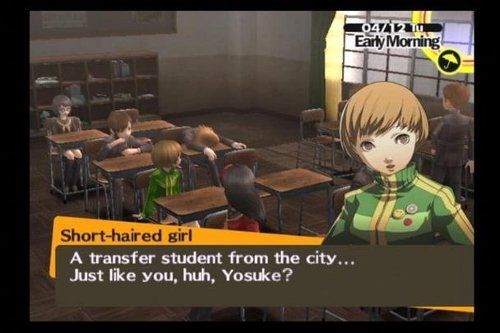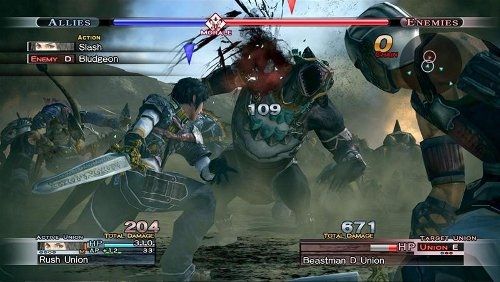There was a time when Western audiences ate up Japanese RPGs like candy - during the prime years for that genre in the mid- to late-90s. Perhaps back then things were simpler and we didn't expect as much. Maybe JRPGs seemed like novelty items - something rare, precious and different. They captured our imaginations with their deep, involving stories and amazed us with their graphical presentation. But, times have changed.
While many JRPGs still push the graphical limits of modern consoles, we all know that visual appeal alone isn't enough to float a game that no one wants to play. Also, there are many and varied reasons why it seems like Japanese RPGs have fallen out of favor with Western audiences in this new century. Perhaps gamers feel that they aren't trying to innovate enough, perhaps this new generation of gamers wants your garden variety shooter where there is action every second of the way or maybe JRPGs just aren't growing with the times.
I'm of the opinion that innovation isn't everything. Graphics are in the same boat; they aren't really what makes a game tick. To reveal my opinion of what JRPGs really need to start capturing the hearts of Western audiences once more, all you have to do is look toward other forms of modern entertainment. In the past, movie-goers and TV viewers were enraptured by the fantastical. Shows like the original Star Trek and movies like the earlier James Bond films captured people's imaginations and took them on a journey to times, places and situations that were "out there". People really enjoyed that at the time.
As time passed, however, focus moved from these imaginative places into a more personal space. Star Trek and James Bond began a visible decline in the earlier part of this decade (some would say even before that), likely because the audience wanted more intimate fare instead of the flash and dazzle of sleek spaceships and fancy gadgets. People wanted to be able to relate to the characters they were viewing in these programs, therefore television and movie genres bended themselves to the desires of their target audience. Today we have shows in those same genres - such as the new Battlestar Galactica - that seem to focus more on the people, while using the sci-fi setting as more of a backdrop to the unfolding personal drama than anything else. What happens? The audience eats it up like candy.
The point of all this? Again, it's because the mentality of people has changed. We want to be able to see the characters in these programs and, by extension, in the games we play, in situations that are relatable to our everyday lives. The backdrop doesn't matter anymore; that is no longer the focus of our attention. A game could be set in a fantasy world, a sci-fi world or a world that mirrors our own present day, as long as the characters themselves and the situations those characters face can be related to by the audience. And herein lies the problem - JRPGs have the fantasy thing down pat. What they need to work on is the stories they tell and how the characters in those stories relate to their target audience. When they do that, they succeed both critically and popularly.
Take Persona 4, for example. The story itself casts a heavy focus on the characters and their innermost fears, all of which any given individual who is playing that game could possibly relate to. The characters aren't in some crazy military unit on some unknown planet battling an unknown enemy - they're relatable, battling feelings that we, as humans, deal with every day. That whole experience is then given the backdrop of this surreal Earth town with mysterious happenings. Note that the setting isn't the focal point of the story, no, the focus is on the characters, their relationships with one another and their innermost thoughts and concerns.
A turn toward the more mature wouldn't hurt, either. And by "mature" I do not in any way, shape or form mean gratuitous blood, gore and sexual content. What I mean is mature themes. In Persona 4 we see characters worried about acceptance because of their chosen lifestyle and we see characters searching for who they really are. There's nothing wrong with delving into the darker recesses of the mind and exploring those aspects of the human condition, assuming it isn't done gratuitously. That's what people want - that's what they eat up. Why are we still seeing childish, cliché characters and over-done stories when these games could be so much more? There's nothing wrong, per se, with these types of tales, but why not stretch the envelope? Let's not be afraid of media freak-outs and non-gamer public opinion.
While a relatable cast of characters and story-based situations isn't the only thing that JRPGs need to present a broader appeal to Western audiences, it is one thing that I feel needs the most work. Look at Western RPGs like the recently released Dragon Age: Origins - that game has heavy themes running throughout that you rarely, if ever, see in a JRPG. You see how the characters deal with slavery, abuse, betrayal, murder and even rape. At their best, JRPGs might feature one of those themes, and never the worst of them.
Eastern developers have tried time and again to make their games appeal to Western audiences. The Last Remnant was heralded as being a role-playing game with worldwide appeal, yet it still held very tightly to JRPG clichés in nearly all story- and character-related aspects. We want more than war between nations and a mystical artifact of power, we want more than the anmesiac boy who ends up being the last survivor of some powerful beings. There are strides being taken, but I don't feel they're large enough. The Persona titles are working in the right direction. In a way, it seems Eastern developers just don't want to get their hands dirty. Don't get me wrong, standard happy-go-lucky RPG fare has its place, but to appeal to that worldwide audience, we need more.
Who will be the first to break the mold, to really sell a game in the JRPG style to Western audiences and receive critical and popular acclaim worldwide? Sorry Square-Enix, Final Fantasy XIII is a shoo-in for massive sales worldwide because if the name alone, so it doesn't count. I don't want to advocate changing JRPGs at a fundamental level, because there is a certain visual presentation and style, as well as certain game mechanics, that make JRPGs, as a genre, what they are. No, that's not what I'm looking to change and, in fact, I hope that never changes. If you want an RPG done in the Western style, go play Oblivion or Dragon Age: Origins. What I'm talking about is the characters, the story and how that all relates to how well the gamers become engaged in the game as a whole. I do hope in the future Eastern developers get their hands dirty and try something outside of the box where these points are concerned, pushing the limits of expression, freedom and our imaginations to the point that the Western audience will once again appreciate Japanese RPGs like they did in times past.



